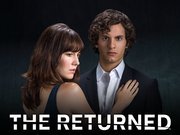 For an overwhelmingly secular society, an awful lot of today’s popular entertainment is decidedly metaphysical or paranormal in nature. A surprising number of current TV shows point to a reality beyond the merely physical, speaking to something in us that doesn’t seem to be fully satisfied with the notion that all that we can see is all that there is.
For an overwhelmingly secular society, an awful lot of today’s popular entertainment is decidedly metaphysical or paranormal in nature. A surprising number of current TV shows point to a reality beyond the merely physical, speaking to something in us that doesn’t seem to be fully satisfied with the notion that all that we can see is all that there is.
Among the best of these shows is ABC’s Forever, about a man who was killed more than 200 years ago but comes back to life, again and again and again. This show is a cross between your average time travel movie and Sherlock Holmes, and it is very good. The CBS show Under the Dome is another that centers on bizarre phenomena that are ostensibly unexplainable in simply material terms.
Another two series share a similar story foundation: people returning from the dead: ABC’s Resurrection, and A&E’s The Returned. (In fact, those that come back from the dead in Resurrection are called “the returned,” but there is no connection between the shows, other than the main concepts and interesting timing.) Fox’s wonderful Sleepy Hollow is yet another show in which a character from the distant past lives today.
This is not even to mention all the biblically based movies and TV shows of the last year or so, including the currently running series A.D.: The Bible Continues, by husband-and-wife production team Roma Downey and Mark Burnett. You could also add NBC’s Grimm to the list of shows dealing with phenomena beyond nature.
To return to The Returned, it’s a faithful remake of a French drama of the same name, and in a recent episode it made a salient point that typically applies to entertainment of a supernatural genre: modern, post-Enlightenment people tend to be more concerned with how things work than why they happen. Until the Greco-Roman world merged with the Judeo-Christian world and eventually transformed Western culture through the Middle Ages into the Renaissance and the Enlightenment, how was a very limited question. Everyone knew the gods or God created the world, and how they or He did was just not a human concern.
In a recent episode of The Returned, one of the living asks one of the walking dead how this could have happened, all these people coming back to life. The reply she gets is, “The more pertinent point is why.” The modern non-dead person is focused on the mechanism, whereas the people who died but now live again don’t much care how it happened; all they know is that they are alive again and have a new lease on life. Much of the show appears to deal with the matter of redemption, how these people given another shot at life may want to make different choices than those they made in their first go-round. Of course, human nature being what it is, we’re not quite sure that they’ll succeed in doing better this time around.
For all the wonderful (and some not so wonderful) things science has given us, it can’t explain everything, yet the cultural narrative today often implies that science can do so. Yet, as these examples show (and they by no means exhaust the inventory of programming that includes such elements), there is obviously a great demand for stories that reach beyond a conventional, purely materialistic understanding of things, to confront mysteries that cannot be explained, as much as we might like them to be. Somehow we know they such mysteries are intimately connected to the human condition as we strive to figure out this strange thing called life.

” Hell, life is like that. You ride to the top of the wave and then you come crashing down again.”
The lead actor on “Forever” has announced the tv shows cancelation.
So sorry to hear that. I hadn’t got around to seeing it, but heard much good about the show.
http://www.bizjournals.com/nashville/blog/2015/04/state-commits-8m-to-nashville-incentives.html
If ABC renews “Nashville” for a fourth season, it has at least $8 million reasons to keep the filming of the show local.
As reported Wednesday by The Tennessean, the state has allocated $16 million to the Department of Economic and Community Development film and television incentive fund, $8 million of which has been flagged for ABC’s primetime drama.
Are you going to do anything to get “Forever” renewed for a second season?
There is nothing on this website about trying to get the show renewed.
Thanks for the comment. I have heard nothing but good about Forever, but I have yet to watch it. I will try to do so.